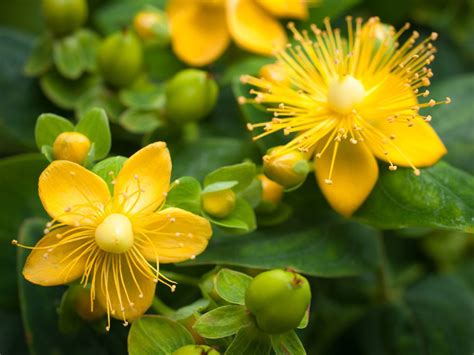The St John's Wort plant, known scientifically as Hypericum perforatum, has been a cornerstone of traditional medicine for centuries, particularly in the treatment of mild to moderate depression. This perennial herb, characterized by its bright yellow flowers and oval-shaped leaves, is native to Europe, Western Asia, and North Africa, but has been naturalized in many parts of the world, including North America. The plant's therapeutic properties are attributed to its unique combination of bioactive compounds, including hyperforin, hypericin, and flavonoids, which have been extensively studied for their antidepressant, anti-inflammatory, and antimicrobial activities.
Key Points
- The St John's Wort plant is primarily used for treating mild to moderate depression due to its bioactive compounds.
- It has anti-inflammatory and antimicrobial properties, making it useful for wound healing and infections.
- Hyperforin and hypericin are key components responsible for its therapeutic effects.
- Despite its benefits, St John's Wort can interact with various medications, necessitating caution and medical supervision.
- Its antidepressant effects are comparable to standard prescription antidepressants in cases of mild depression.
Cultivation and History

St John’s Wort has a rich history that dates back to ancient Greece, where it was used to treat a variety of ailments, including nerve pain and anxiety. The plant’s name is derived from St. John the Baptist, as it traditionally blooms around St. John’s Day (June 24th). Its cultivation is relatively easy, as it can thrive in a variety of conditions, though it prefers well-drained soil and full sun. This adaptability has contributed to its widespread distribution and use across different cultures and medicinal traditions.
Chemical Composition and Pharmacological Effects
The pharmacological effects of St John’s Wort are primarily attributed to its complex mixture of bioactive compounds. Hyperforin, one of the plant’s key constituents, is known for its ability to inhibit the reuptake of serotonin, dopamine, and norepinephrine, thereby increasing the levels of these neurotransmitters in the brain and contributing to its antidepressant effects. Hypericin, another significant component, has been shown to have anti-inflammatory and antimicrobial properties, further expanding the plant’s therapeutic potential. The synergistic action of these compounds, along with flavonoids and other constituents, underpins the plant’s efficacy in treating not only depression but also anxiety, sleep disorders, and certain viral infections.
| Component | Therapeutic Effect |
|---|---|
| Hyperforin | Inhibition of neurotransmitter reuptake, contributing to antidepressant effects |
| Hypericin | Anti-inflammatory and antimicrobial activities |
| Flavonoids | Antioxidant properties, contributing to overall health and well-being |

Preparations and Dosage

St John’s Wort is available in various forms, including capsules, tablets, teas, and tinctures. The standard dosage for treating depression is typically in the range of 300 to 1,200 mg per day, standardized to contain 0.3% hypericin. However, the optimal dosage can vary depending on the specific preparation and individual response, underscoring the importance of personalized medical guidance. Despite its potential benefits, it is crucial to approach St John’s Wort with caution, particularly due to its potential interactions with other medications and its effects on sensitive individuals, such as pregnant women and those with bipolar disorder.
Safety and Side Effects
While generally considered safe when used appropriately, St John’s Wort can cause side effects, including dry mouth, dizziness, gastrointestinal symptoms, and increased sensitivity to sunlight. Serious side effects are rare but can include allergic reactions and serotonin syndrome, especially when combined with other antidepressants. The plant’s impact on drug metabolism also necessitates careful management for individuals on prescription medications. Thus, a balanced perspective that weighs the potential benefits against the risks, under the guidance of a healthcare professional, is essential for safe and effective use.
Can St John's Wort be used in conjunction with prescription antidepressants?
+Generally, it is not recommended to use St John's Wort with prescription antidepressants due to the risk of serotonin syndrome and other interactions. However, this should be discussed with a healthcare provider, as individual circumstances may vary.
How long does it take for St John's Wort to start working for depression?
+The onset of action for St John's Wort can vary, but improvements in depressive symptoms are typically noticed within 2 to 4 weeks of consistent use. It's essential to maintain patience and adhere to the recommended dosage and treatment duration under medical supervision.
Are there any specific dietary restrictions or lifestyle changes recommended when taking St John's Wort?
+While there are no strict dietary restrictions, maintaining a balanced diet and a healthy lifestyle can enhance the therapeutic effects of St John's Wort. Additionally, avoiding excessive alcohol consumption and limiting exposure to sunlight due to increased sensitivity are recommended.
In conclusion, the St John’s Wort plant offers a natural alternative for managing mild to moderate depression and other conditions, thanks to its unique blend of bioactive compounds. However, its use requires careful consideration of potential drug interactions, side effects, and individual health status, highlighting the need for medical supervision. By understanding the plant’s chemical composition, therapeutic effects, and proper use, individuals can harness its benefits while minimizing risks, contributing to a more holistic approach to health and wellness.



